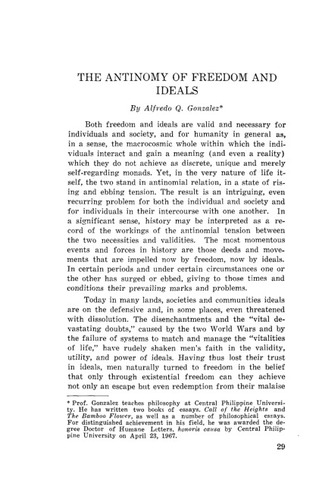The antimony of freedom and ideals
Abstract
Prof. Gonzalez taught philosophy at Central Philippine University. He has written two books of essays. Call of the Heights and The Bamboo Flower, as well as a number of philosophical essays. For distinguished achievement in his field, he was awarded the degree Doctor of Humane Letters, honoris causa by Central Philippine University on April 23, 1967.
Both freedom and ideals are valid and necessary for individuals and society, and for humanity in general as, in a sense, the macrocosmic whole within which the individuals interact and gain a meaning (and even a reality) which they do not achieve as discrete, unique and merely self-regarding monads. Yet, in the very nature of life itself, the two stand in antinomial relation, in a state of rising and ebbing tension. The result is an intriguing, even recurring problem for both the individual and society and for individuals in their intercourse with one another.
Today in many lands, societies and communities ideals are on the defensive and, in some places, even threatened with dissolution. The disenchantments and the “vital devastating doubts,” caused by the two World Wars and by the failure of systems to match and manage the “vitalities of life,” have rudely shaken men’s faith in the validity, utility, and power of ideals. Having thus lost their trust in ideals, men naturally turned to freedom in the belief that only through existential freedom can they achieve not only an escape but even redemption from their malaise and their predicament.
Description
Journal article
Suggested Citation
Gonzalez, A. Q. (1967). The antimony of freedom and ideals.Type
ArticleSubject(s)
Collections
The following license files are associated with this item:


